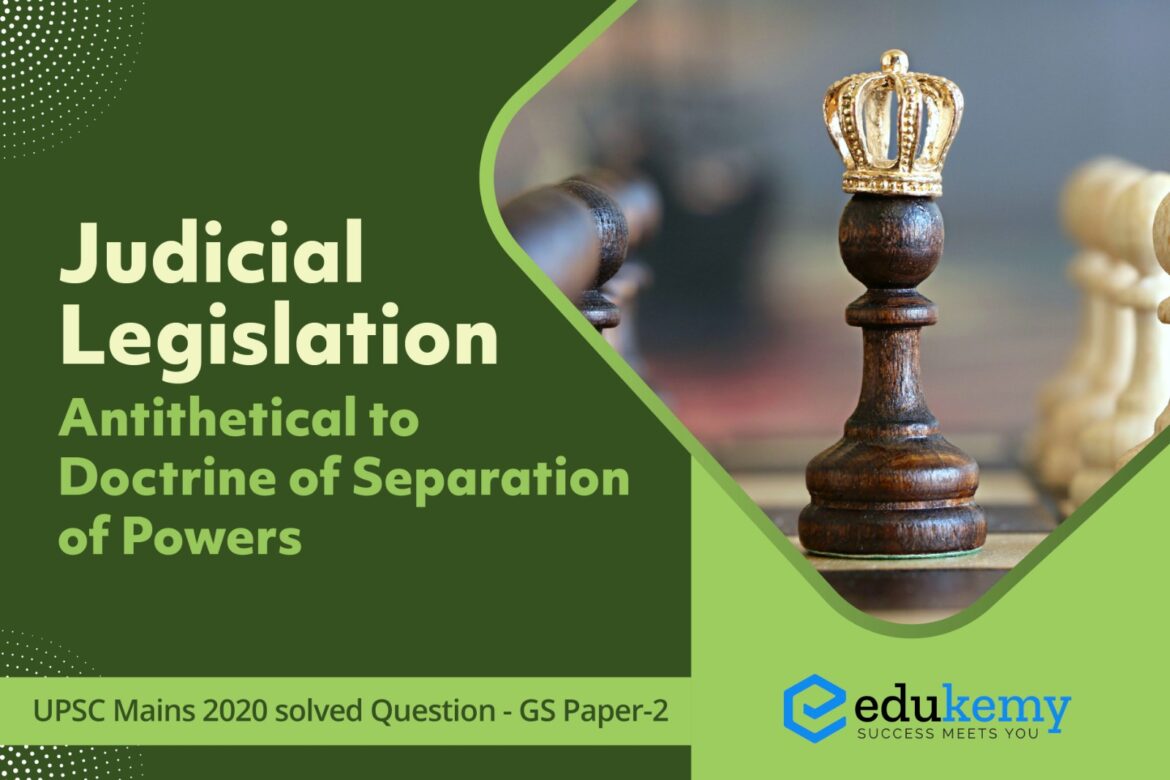Judicial legislation, wherein courts assume a legislative role by actively formulating and implementing laws, stands in direct contradiction to the foundational principle of the separation of powers enshrined in the Indian Constitution. The doctrine of separation of powers aims to prevent an undue concentration of authority in any one branch of the government, fostering a system of checks and balances. However, the filing of numerous public interest petitions seeking the issuance of guidelines to executive authorities can be viewed as a necessary response to the evolving complexities of governance. In a dynamic society, the executive often faces novel challenges that demand innovative solutions. Public interest petitions serve as a means for the judiciary to guide and ensure that executive actions adhere to constitutional principles without overstepping its own mandate. While judicial activism should be exercised judiciously, the filing of such petitions underscores the need for a collaborative approach to address societal issues within the framework of constitutional governance.
UPSC Mains General Studies Paper – 2 Mains 2020
Separation of powers between various organs, dispute redressal mechanisms and institutions
UPSC Mains Civil Services IAS Exam Question Paper – 2020
Contents
- 1 Structure of the Question
- 2 Answer
- 3 Conclusion
- 4 Frequently Asked Questions (FAQs)
- 4.1 1. What is Judicial Legislation, and how does it challenge the doctrine of separation of powers in the Indian Constitution?
- 4.2 2. How does Judicial Legislation impact the balance of powers in the Indian constitutional framework?
- 4.3 3. Why are there numerous public interest petitions seeking guidelines for executive authorities in response to Judicial Legislation concerns?
- 4.4 4. How do public interest petitions contribute to maintaining checks and balances in light of Judicial Legislation concerns?
- 4.5 5. Can the filing of public interest petitions be considered a necessary remedy against the challenges posed by Judicial Legislation?
Structure of the Question
- In the Introduction,
- Try to mention the Doctrine of Separation of Powers.
- In Body,
- Judicial Legislation and instances of its implementation.
- Judiciary and Public Interest Litigation (PIL).
- In Conclusion,
- Try to suggest a healthy implementation of Judicial Legislation.
Answer
Introduction
The tenet of separation of powers conceives explicit powers given to the legislature, executive, and judiciary. It infers negligible obstruction by one organ in the working of another organ. This doctrine is one of the basic structures of the Constitution. Various constitutional provisions like Articles 50, 121, and 211, etc. embody the spirit of this doctrine.
- The executive is vested with the power to make policy decisions and implement laws.
- The legislature is empowered to issue enactments and review the functioning of the executive.
- The judiciary is responsible for adjudicating disputes. The judiciary also exercises judicial review over the executive and legislative action (Articles 32 and 226).
The separation of powers is important because it provides a vital system of ‘checks and balances’.
Judicial Legislation and Instances of Implementation
- Making law is the domain of the legislature. But occasionally, the judiciary has issued guidelines and made policies in the cloak of judgments, assuming the power of the legislature.
- For example, in the Arun Gopal case (2017), the Supreme Court fixed timings for bursting Diwali fireworks, although there are no laws to that effect.
- In the M.C. Mehta case (2018), the court annulled Rule 115(21) of the Central Motor Vehicle Rules, 1989, when it directed that only BS-VI vehicles can be sold after March 30, 2020.
Judiciary and Public Interest Litigation (PIL)
Need for Public Interest Litigation(PIL)
Social Justice meets Social Ends
Public interest petitions are instrumental in bringing about a new code of something when there is no legislative framework for it, nor it is possible to have it shortly.
Non-performance of Duty
Often the legislature fails to make the necessary legislation to suit the changing times and the executive fails to perform their administrative functions.
Help to Marginalised Section
PILs fall under categories such as bonded labor matters, neglected children, non-payment of minimum wages to workers and exploitation of casual workers, and petitions from jails complaining of harassment, atrocities on women, etc. It can help advance the cause of minority or disadvantaged groups or individuals.
Justice is Directly Accessible
In the Asiad Workers judgment case, Justice P.N. Bhagwati held that anyone getting less than the minimum wage can directly approach the Supreme Court without going through the labor commissioner and lower courts.
Judicial Intervention
The judiciary has been compelled to intervene in the domain of the legislature and issued guidelines to the executives in the cases of fundamental rights of the people being threatened by the State, failure in performing administrative functions by authorities, and failure of the legislature to make the necessary legislation in the changing times:
- In the K.Puttaswamy case(2017), the court pronounced that the right to privacy is intrinsic to the right to life and provided the three-step test to decide on the constitutionality of any law infringing privacy.
- In the Vishaka case(1997), the judgment recognized sexual harassment as a violation of fundamental rights and the guidelines also directed for the Sexual Harassment of Women at Workplace (Prevention, Prohibition and Redressal) Act, 2013.
Conclusion
Thus, though Judicial Legislation is antithetical to the doctrine of separation of powers, sometimes it becomes justifiable for the judiciary to issue guidelines to executive authorities. Nevertheless, to see that judicial activism does not become judicial adventurism, the courts must act with caution and proper restraint. In the spirit of democratic governance, all three organs of the State should discharge their obligations freely and independently, entrusted with intervention only where required in the larger interest of the citizens of India.
Read our Solved Papers.
Frequently Asked Questions (FAQs)
1. What is Judicial Legislation, and how does it challenge the doctrine of separation of powers in the Indian Constitution?
Judicial Legislation refers to the phenomenon where the judiciary, instead of interpreting laws, actively engages in lawmaking. This poses a challenge to the doctrine of separation of powers, a fundamental principle in the Indian Constitution that delineates distinct functions for the legislative, executive, and judicial branches. When the judiciary assumes legislative functions, it blurs these lines, potentially undermining the intended checks and balances. This FAQ explores the concept of Judicial Legislation and its implications for the separation of powers.
2. How does Judicial Legislation impact the balance of powers in the Indian constitutional framework?
The doctrine of separation of powers is crucial for maintaining a delicate balance between the three branches of government. Judicial Legislation, by allowing the judiciary to create laws, disrupts this equilibrium. This FAQ delves into the consequences of such disruption, analyzing how an imbalance in powers can lead to potential overreach, compromising the democratic principles enshrined in the Indian Constitution.
Given the potential threats posed by Judicial Legislation to the separation of powers, there is a surge in public interest petitions. Citizens, activists, and organizations file these petitions to request the judiciary to issue guidelines to executive authorities. This FAQ explores the motivations behind these petitions, examining the role of concerned citizens in safeguarding the constitutional principles and seeking clarity on the boundaries between the branches of government.
4. How do public interest petitions contribute to maintaining checks and balances in light of Judicial Legislation concerns?
Public interest petitions play a pivotal role in the democratic process by acting as a check on potential overreach of power. In the context of Judicial Legislation, these petitions become a means for citizens to seek judicial guidance on the limits of executive authority. This FAQ delves into the ways in which public interest litigation contributes to upholding the doctrine of separation of powers and ensuring accountability in governance.
5. Can the filing of public interest petitions be considered a necessary remedy against the challenges posed by Judicial Legislation?
In the face of Judicial Legislation concerns, the filing of public interest petitions can be seen as a necessary remedy to address the resulting imbalances. This FAQ explores the justifiability of such petitions, examining whether they serve as an essential tool for citizens to actively participate in preserving the constitutional principles of separation of powers and preventing potential encroachments by any branch of government.
For UPSC Prelims Resources, Click here
For Daily Updates and Study Material:
Join our Telegram Channel – Edukemy for IAS
- 1. Learn through Videos – here
- 2. Be Exam Ready by Practicing Daily MCQs – here
- 3. Daily Newsletter – Get all your Current Affairs Covered – here
- 4. Mains Answer Writing Practice – here
Visit our YouTube Channel – here



